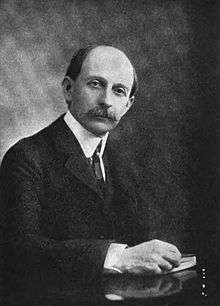Clinton Scollard
| Clinton Scollard | |
|---|---|
 Clinton Scollard, 1902 | |
| Born |
September 18, 1860 Fayettefille, New York |
| Died | 1932 |
| Nationality | U.S.A. |
| Education | |
| Alma mater | Hamilton College (1861) |
| Occupation | Poet |
| Notable work | "As I Came Down from Lebanon" |
| Spouse(s) |
Georgia Brown (Divorced 1924) Jessie Belle Rittenhouse |
| Children | Elizabeth Parlon |
| Parent(s) | Dr. James I. and Elizabeth S. Scollard |
Clinton Scollard (1860–1932) was an American poet and writer of fiction. He was a Professor of English at Hamilton College, and collaborator and husband of Jessie Belle Rittenhouse.
Professional career
Scollard was born at Clinton, New York on September 28, 1860, son of James Isaac and Mary Elizabeth (Stevens) Scollard.[1] He graduated from Hamilton College in 1881, and later attended Harvard University,[2] where his friends included poets Bliss Carman and Frank Dempster Sherman. At Hamilton, where he was a member of the Chi Psi fraternity, he played varsity baseball and is credited with introducing the curveball to college baseball.
After a period in Cambridge, Massachusetts, he spent a year at University of Cambridge in England. In 1888 he became an Associate Professor of English at Hamilton College, where he remained until 1896. Except for a further year in the English Department at Hamilton College in 1911, he devoted the rest of his life to creative writing.[3] Hamilton granted him an honorary L.H.D. in 1906.[4]
Associates
Corresponded with Martha Foote Crowe.[5] Oley Speaks composed the song "Sylvia" to lyrics by Scollard.
Family
On July 3, 1890 Scollard married Georgia Brown of Jackson, Michigan; they had one daughter Elizabeth Scollard Parlon, but they divorced in early 1924.[1] On 20 March 1924 Scollard married fellow poet Jessie Belle Rittenhouse.[4] They had no children and he died in 1932.[3]
Assessment
Scollard has been characterized as a minor poet but a fine technician:[3]
- He knew himself to be a fine craftsman, able to fashion delicate lyrics that forbear contemplative weight for perfection in form. His verse delights in the natural world, in small incidents that are honed to perfection. It is easy to view him as a Frost without the philosophy.
Principal Works of Verse
- Pictures in Song (1884)
- With Reed and Lyre (1886)
- Old and New World Lyrics (1888)
- Songs of Sunrise Lands (1982)
- Under Summer Skies (1892)
- On Sunny Shores (1893)
- The Hills of Song (1895)
- The Lutes of Morn (1901)
- Lyrics of the Dawn (1902)
- The Lyric Bough (1904)
- A Southern Flight (1906) (with Frank Dempster Sherman)
- Blank Verse Pastels (1907)
- Chords of the Zither (1910)
- Poems (1914)
- Sprays of Shamrock (1914)
- Italy in Arms, and Other Poems(1915)
- Vale of Shadows and Other Verses of the Great War (1915)
- Ballads, Patriotic and Romantic (1916)
- The Poems of Frank Dempster Sherman, Ed. Clinton Scollard (1917)
- Lyrics From a Library (1917)
- The Bird-Lovers' Anthology, Compiled by Clinton Scollard and Jessie Belle Rittenhouse (1930)
- Patrician Rhymes; a Résumé of American Society Verse from Philip Freneau to the Present Day, Ed. by Clinton Scollard and Jessie B. Rittenhouse (1932)
- Songs from a Southern Shore (1932)
- The Singing Heart; Selected Lyrics and Other Poems of Clinton Scollard Ed. by Jessie B. Rittenhouse (1934)
References
- 1 2 Dictionary of American Biography (Vol. VIII). 1935. p. 485.
- ↑ Rittenhouse, Jessie B. (2002 (orig. 1917)). The Little Book of Modern Verse. New York City: Bartleby.com. Check date values in:
|date=(help) - 1 2 3 Haralson, Eric L.; John Hollander (1998). Encyclopedia of American Poetry: The Nineteenth Century. Routledge. ISBN 978-1-57958-008-7.
- 1 2 National Cyclopaedia of American Biography (Vol. 23). 1933. p. 160.
- ↑ "Martha Foot Crowe Papers". Syracuse University Library Finding Aids. Syracuse University. 2007. Retrieved 19 Dec 2010.
External links
- Works by Clinton Scollard at Project Gutenberg
- Works by or about Clinton Scollard at Internet Archive
- Works by Clinton Scollard at LibriVox (public domain audiobooks)

- Wager, Daniel (1896). Our County and Its People. Boston: The Boston History Company.